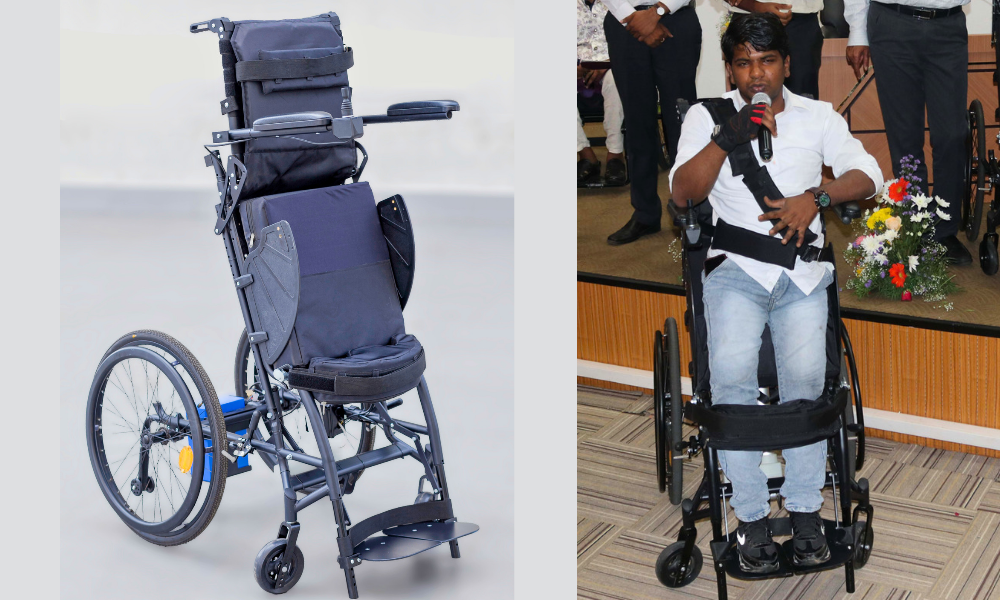
IIT Madras Develops India’s Most Customizable, Indigenously-Developed Electric Standing Wheelchair
The project was sponsored by Tata Elxsi under its CSR initiative
On Wednesday, the Indian Institute of Technology Madras (IIT Madras) launched the NeoStand — an electric standing wheelchair that's customizable and made with indigenous technology. The wheelchair is designed to help users sit for long periods of time and then stand comfortably, reducing the risk of secondary health issues.
This electric wheelchair allows users to stop at intermediate positions using a switch, which can help with therapeutic aspects. For example, a caregiver or therapist can help the user practice standing gradually.
Launched at the IIT Madras campus on 20th March 2024 in the presence of Prof. V. Kamakoti, Director, IIT Madras, NeoStand is India’s most customizable Electric Standing Wheelchair, and has been developed indigenously to enhance the quality of life for wheelchair users.
At the touch of a button, wheelchair users can effortlessly transition from sitting to standing, opening a world of possibilities - be it engaging in eye-level conversations, reaching for a book, or simply enjoying a cup of coffee standing by a counter.
 |
| NeoStand |
Key features of the NeoStand:
1. Customizability: NeoStand is designed to be highly customizable, catering to the specific needs of individual users. This adaptability ensures that it can accommodate a wide range of requirements.2. Motorized Standing Mechanism: With the touch of a button, wheelchair users can seamlessly transition from a sitting position to standing. This functionality opens up new possibilities, such as engaging in eye-level conversations, reaching for objects, or enjoying a cup of coffee while standing at a counter.
3. Compact Design: NeoStand's compactness allows easy maneuverability even in tight spaces, enhancing accessibility for users.
4. Health Benefits: By providing the freedom to sit for prolonged hours and stand comfortably when needed, NeoStand reduces the risk of secondary health complications associated with prolonged sitting.
5. Innovative Approach: The wheelchair offers a seamless transition between sitting and standing, with the option to pause midway. This approach underscores its commitment to improving users’ quality of life and social participation.
ZD0L.jpeg) |
0WB2.jpeg) |
| Mr. Justin Jesudas using NeoStand |
Justin Jesudas, who has had quadriplegia for 14 years, says that the ability to stand with the push of a button makes the wheelchair more inclusive and helps quadriplegics stand independently.
The journey of NeoStand from concept to reality was supported by a collaborative ecosystem. The project was sponsored by Tata Elxsi under its corporate social responsibility initiative. The development and design were spearheaded by the TTK Center for Rehabilitation Research and Device Development (R2D2) at IIT Madras and NeoMotion, which took the lead in bringing this product to the marketplace.
The project development was led by Prof. Sujatha Srinivasan, Head, TTK Center for Rehabilitation Research and Device Development (R2D2), IIT Madras, who also led the development of ‘Arise,’ India’s first manual standing wheelchair, and NeoBolt, the country’s first motorized add-on for wheelchairs. This device has been commercialized and is being taken to the market through NeoMotion, an IIT Madras-incubated start-up.
For the majority of wheelchair users across the globe, the ability to stand is far-fetched. Standing is essential for better blood circulation, and digestion, preventing health issues like pressure sores and crucial for daily activities. Currently, users are often dependent on external help and some need to use orthoses. For persons with severe disabilities who have compromised upper body strength, this is a significant challenge, and a manual standing wheelchair is inadequate.
This groundbreaking initiative demonstrates the impact of translational research guided by IIT Madras faculty. NeoStand redefines the wheelchair experience, emphasizing user-centric design and empowering individuals with mobility challenges. As we navigate the complexities of accessibility and societal attitudes, let us recognize that advancements in assistive technology are not only technological imperatives but also moral imperatives.








 IndianWeb2.com is an independent digital media platform for business, entrepreneurship, science, technology, startups, gadgets and climate change news & reviews.
IndianWeb2.com is an independent digital media platform for business, entrepreneurship, science, technology, startups, gadgets and climate change news & reviews.
ليست هناك تعليقات
إرسال تعليق